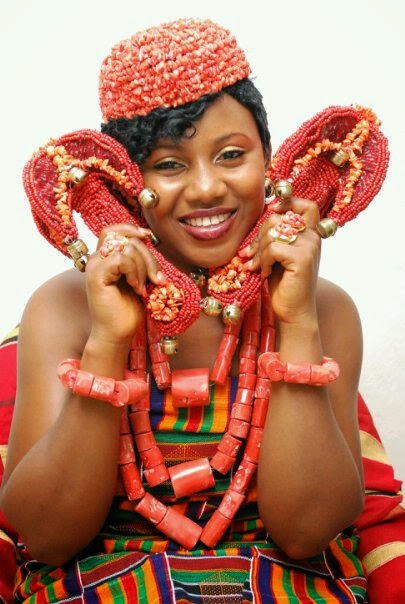The Ibibio are a people of southeastern Nigeria. They are
related to the Anaang and the Efik peoples. During colonial period in Nigeria,
the Ibibio Union asked for recognition by the British as a sovereign nation
(Noah, 1988). The Annang, Efik, Ekid, Oron and Ibeno share personal names,
culture, and traditions with the Ibibio, and speak closely related varieties of
Ibibio-Efik. The Ibibio have lived in the Cross River area of modern day
Nigeria for several hundred years, and while written information about them
only exists in colonial records from the late 19th century on, oral traditions
have them in the region much earlier than this. "Ibio-ibio" means
short or brief and doesn't have anything to do with "ulok" and while
it is called "ufok" by some other Ibibio groups. The name
"Ikot" often replaces "the house of... or the people of ", referring
to their origin or ancesstors. Another meaning for Ikot in Ibibio land is bush.
Ibibio religion was of two dimensions, which centered on the pouring of
libation, worship, consultation, communication and invocation of the God of
Heaven (Abasi Enyong) and God of the Earth (Abasi Isong) by the Constitutional
and Religious King/Head of a particular Ibibio Community who was known from the
ancient times as the Obong-Ikpaisong (the word 'Obong Ikpaisong' directly
interpreted means King of the Principalities of the Earth' or 'King of the
Earth and the Principalities' or Traditional Ruler). The second dimension of
Ibibio Religion centered on the worship, consultation, invocation, sacrifice,
appeasement, etc. of the God of the Heaven (Abasi Enyong) and the God of the
Earth (Abasi Isong)through various invisible or spiritual entities (Ndem) of
the various Ibibio Division such as Etefia Ikono, Awa Itam, etc. The Priests of
these spiritual entities (Ndem) were the Temple Chief Priests of the various
Ibibio Divisions. A particular Ibibio Division could consist of many
inter-related autonomous communities or Kingdoms ruled by an autonomous
Priest-King called Obong-Ikpaisong, assisted by Heads of the various Large
Families (Mbong Ekpuk) which make up the Community. These have been the ancient
political and religious system of Ibibio people from time immemorial.
Tradition, interpreted in Ibibio Language, is 'Ikpaisong'. Tradition
(Ikpaisong) in Ibibio Custom embodies the Religious and Political System. The
word 'Obong' in Ibibio language means 'Ruler, King, Lord, Chief, Head' and is
applied depending on the Office concern. In reference to the Obong-Ikpaisong,
the word 'Obong' means 'King' In reference to the Village Head, the word means
'Chief'. In reference to the Head of the Families (Obong Ekpuk), the word means
'Head' In reference to God, the word means 'Lord'. In reference to the Head of
the various societies - e.g. 'Obong Obon', the word means 'Head or Leader'.










